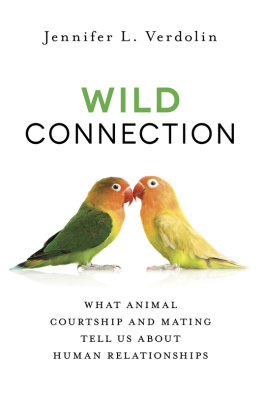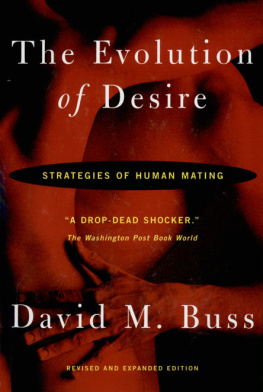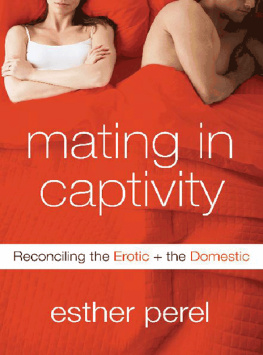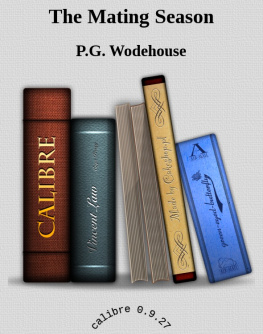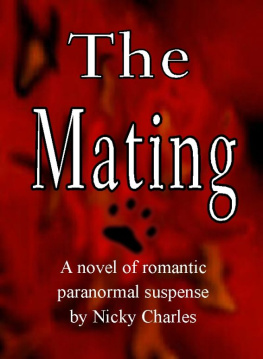First and foremost, we thank the great Lori Handelman, our initial publisher on this book at Oxford, whose intuitive and experienced style helped shape this project from top to bottomand she always helped with a smile. And we thank our new publisher, Abby Gross, whose ability to pick things up and move forward from where things left off has proved outstanding. Oxford runs a tight shipand this book has benefited accordingly throughout this project.
We also thank the folks at Psychology Todayincluding, primarily, Kaja Perina, whose support of the idea of mating intelligence has been enormous for the growth of research on this topic as well as for our ability to produce this book. Kajas consistently bright, competent, and supportive style puts her as a shining star in the industryand this book is better off as a result of her support.
Geoffrey Millers groundbreaking ideas on the interface of intelligence and human mating played a pivotal role in shaping the ideas of this bookand were deeply grateful for his scholarly contributions, which largely serve as a foundation to much of the content in this book. Wed also like to thank one of our collaborators on prior projects related to mating intelligence: the great Maureen OSullivan. Maureens work on deception as a slice of mating intelligence has led to some of the most interesting research on this topic. Having the support and collaboration of someone as respected as Maureen has really been inspirational for us as weve moved forward on this project. The antithesis of the stuffy, arrogant academic, Maureen was simply the most down-to-earth, friendly, and supportive collaborator going. She was a beacon among humanityand we like to think that including her ideas in this book helps her spirit live on. When the world lost Maureen in May of 2010, a silent mourning was felt across the globe. We miss her deeplyand hope that this book comes close to matching her exacting standards!
We are very appreciative to the following people for kindly providing feedback on earlier sections of the manuscript as well giving us relevant references: W. Keith Campbell, Colin DeYoung, Marco Del Giudice, Ryan Johnson, Lee Kirkpatrick, Pranjal Mehta, Lars Penke, and David Schmitt for kindly providing feedback on earlier parts of the manuscript and providing us with relevant references. Several colleagues and students have collaborated with us on our various projects related to mating intelligence, and wed be remiss if we didnt acknowledge them here. From Scott, acknowledgements go to Melanie Beaussart, Colin DeYoung, Jane Erickson, Ben Irvine, James C. Kaufman, Aaron Kozbelt, Michael Magee, Elliot Samuel Paul, and Sheela Ramesh. From Glenn, appreciation goes out to Alice Andrews, Mike Camargo, Rachael Carmen, Rosemarie Chang, Ben Crosier, Jason Diffenderfer, Haley Dillon, Mary Finn, Maryanne Fisher, Andy Gallup, Justin Garcia, Dan Glass, Mandy Guitar, Abbey Kurtz, Laura Johnsen, Ashley Peterson, Sarah Strout, and Stephen Williams. Special thanks to the great Briana Tauber for her outstanding editorial help! And Glenn gives a special thanks to Jane Lehman, the real boss of the psychology departmentwho makes sure that everything gets done so that I have time to work on fun projects like this one! Jane, you are one of a kind!
|| 1 ||
Introduction
Cupids Cognitive Arrow
LARRY KING: What, Professor, puzzles you the most? What do you think about the most?
STEPHEN HAWKING: Women.
LARRY KING: Welcome aboard.
Larry King Live Weekend (December 25, 1999)
Sex is constantly on the mind. When were not thinking about sex, we are thinking about how to get it. Lets face it: the mating world doesnt play by simple rules. Contradictions, paradoxes, and ambiguities are apparent at every stage. The consequence is that we are consumed by thoughts related to mating. Early in relationship formation, we are focused on physical attractiveness and the overall value of potential mates as well as our own mate value. In this mate-selection phase of mating, we often ask questions such as, Is she into me? Is she attractive? Is she attractive enough? What would my friends and family think of her? How can I get her into bed tonight? Is she long-term material?
As we move further into courtship, other universal questions consume us: Am I ready to have sex with him? Is that thing he does when he eats cute? quirky? benign? or downright gross!? Does he always wear shirts like that? Is his apparent kindness genuine? Is he really going to quit smoking? Is he going to be a success?
When in the throes of a long-term relationship, a host of other thoughts consume the normal adult mating mind: Does he really love me? Do I really love him? What has happened to our sex life? Is he interested in whats-her-name sexuallyand, if not, why does it feel like he is? Why am I not turned on anymore? Why do I no longer find him funny? Does he still find me sexy? Am I sexy? I wish he would pay more attention to me and the kids. Does he really have to go out on three business dinners this week? Why does he always have business meetings with her?
Human mating is complex. Mating psychology involves an intricate combination of emotions, physical responses, deep (and often uncontrollable) urges, and many cognitive mechanisms. Many times in your life you have undoubtedly shaken your head in confusion while watching or participating in the mating domain.
Believe it or not, there is hope for understanding many of these mating puzzles. Modern scientists who study human mating from the perspective of our evolutionary origins have developed a framework for understanding mating processes that has led to an extraordinary accumulation of discoveries regarding the nature of our mating mind. Recently, mating researchers have documented qualities of human faces that are universally appealing, qualities of human behavior that are attractive, factors that lead to conflict in relationships, variables that lead to aggression and hostility in relationships, the effects of hormone levels on mating behaviors, and many other puzzling aspects of human mating. In short, evolutionary psychology is unlocking mysteries of human mating that precede the existence of Homo sapiens on the African savanna.
As youll see, evolution has provided us with some mental machinery that, when properly developed in the right context, can help us navigate the fascinatingly complex domain of mating. Even though humans share many instincts with lower animals, we are unique in our capacity for complex problem solving and reflection. Unlike many other species, we dont just look at each other, see a body we like, and have sex with that bodycertainly not typically, in any case. Rather, the behaviors that constitute mating in our species generally require a great deal of high-level conscious and unconscious cognitive work. Therefore, intelligence is at play somewhere in the mating domain.
In thinking about how conscious forms of intelligence make their way into human mating, consider the different phases of matingfrom initial attraction, to courtship, to a long-term relationship. High-level cognitive processesoften involving consciousness and verbal expressionare present at each step. Consider the case of initial attraction. In initial attraction, we think about our own mate valueoften quite consciously. In fact, we often even discuss this issue with others (Am I good enough for her? Tell me what you really thinkbe honestIm seriousreallyno, I mean it ). We think about the mate values of potential partners (Is he rich? He was pretty loud at that partyis he confident because hes a great guy or just a jerk? What kind of dad would he be?). We also use quite a bit of our mind to display our mate valuefrom the creative use of pick-up lines to displays of charisma, intelligence, humor, personality, and compassion.



